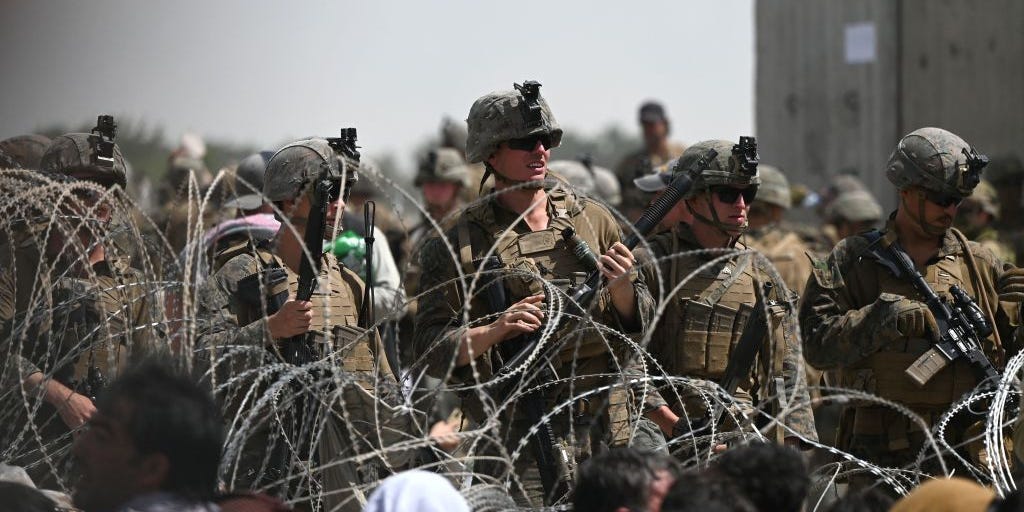
WAKIL KOHSAR/AFP via Getty Images
- The ISIS-K suicide bomber who killed 13 US troops was a prisoner just days before the attack, CNN and Fox News reported Wednesday.
- The bomber was held at Bagram Air Base, which the US turned over to Afghan forces in July, officials said.
- Thousands of prisoners were freed when Afghan forces in the face of a sweeping Taliban offensive.
- See more stories on Insider's business page.
The ISIS-K suicide bomber who killed 13 US service members, as well as more than a hundred civilians, was a prisoner at Bagram Air Base just days before the deadly attack, according to multiple reports.
The bomber was identified by ISIS-K as Abdul Rehman Al-Loghri, and two US officials confirmed the dead attacker's identity to CNN.
Bagram Air Base was a key base of operations for the US and its coalition partners until the US military left it in early July, turning it over to Afghan forces the Biden administration said it was confident had the capability and capacity to defend Afghanistan. The prison was already under Afghan authority and had been for years.
But by mid-August, in the face of a sweeping Taliban offensive, the Afghan military and government crumbled.
The bomber who killed so many people at Hamid Karzai International Airport on Aug. 26 was released from Parwan prison at Bagram Air Base when the Taliban took over the facility on Aug. 15, the same day insurgent forces entered the capital city, Fox News and CNN reported, citing multiple officials and a congressional representative briefed by national security officials.
California Rep. Ken Calvert, the ranking Republican on the House Appropriations Subcommittee on Defense, told Fox News recently that security officials confirmed "that the Aug. 26 Kabul bomber was a known ISIS-K terrorist that was previously detained at the Bagram prison and was released along with thousands of others just days before the deadly attack."
Both Fox and CNN reported Wednesday that other US officials confirmed Calvert's account, which he said was based on "credible" information from Indian intelligence services.
CENTCOM told Insider that because there is still an ongoing investigation into the incidents at Abbey Gate, it is not in a position to say anything on the matter at this time.
Asked how many ISIS-K prisoners were left at Bagram when the US departed and are believed to have been released in late August, Pentagon press secretary John Kirby told reporters that "clearly, it's in the thousands."
The tragic bombing at Abbey Gate on Aug. 26 as the US was carrying out a massive evacuation effort claimed the lives of 11 Marines, one Navy sailor, and one Army soldier. Another 18 American troops were injured. One of the wounded remains in serious but stable condition at Walter Reed National Military Medical Center.
As the Biden administration continues to face criticism over its handling of the US withdrawal from Afghanistan, Republicans have continued to zero in on Bagram, questioning whether keeping a presence there would have made the pullout less chaotic.
During recent congressional hearings on the Afghanistan withdrawal, Secretary of Defense Lloyd Austin and Chairman of the Joint Chiefs of Staff Gen. Mark Milley were grilled by lawmakers on the US withdrawal from Bagram.
"Retaining Bagram would have required putting as many as 5,000 U.S. troops in harm's way just to operate and defend it. And it would have contributed little to the mission that we'd been assigned, and that was to protect and defend the embassy, which was some 30 miles away," Austin told the House Armed Services Committee.
Austin was also asked by GOP Rep. Vicky Hartzler of Missouri whether the ISIK-K bomber who killed the 13 US service members had been a prisoner at Bagram. Her time expired before Austin was able to answer.
Milley echoed Austin in defending the US leaving Bagram.
"All together securing Bagram would have required approximately 5-6,000 additional troops assuming no indigenous partner force was available," the general said to the Senate Armed Services Committee, adding that Hamid Karzai International Airport in Kabul, not Bagram, was "going to be the center of gravity" for any noncombatant evacuation operation.